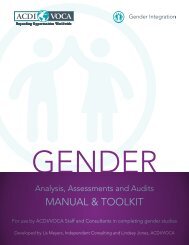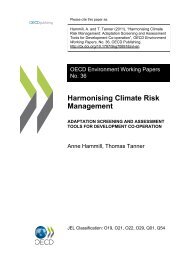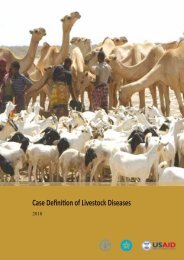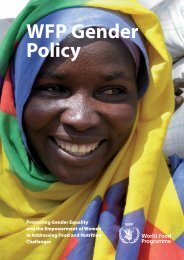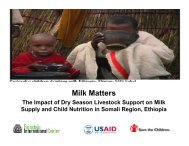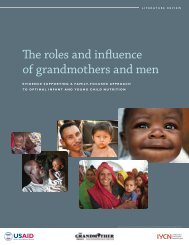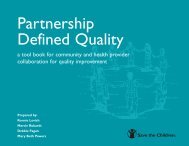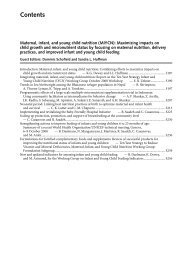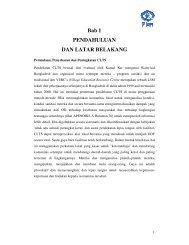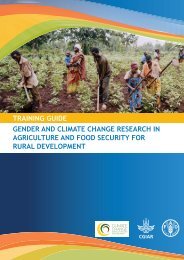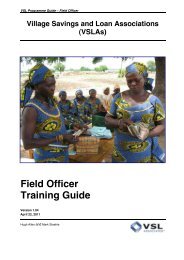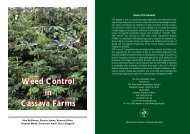Module 2. Theorethical Concepts of Gender - FSN Network Portal
Module 2. Theorethical Concepts of Gender - FSN Network Portal
Module 2. Theorethical Concepts of Gender - FSN Network Portal
Create successful ePaper yourself
Turn your PDF publications into a flip-book with our unique Google optimized e-Paper software.
Mainstreaming <strong>Gender</strong> into Water, Sanitation and Hygiene (WASH) Programs<br />
<strong>Module</strong> 2: Theoretical <strong>Concepts</strong> <strong>of</strong> <strong>Gender</strong><br />
Lesson 8: Social Vulnerability and WASH<br />
Despite women’s central role as the primary carers <strong>of</strong> water, as a result <strong>of</strong><br />
these constraints, women have a very limited voice in the kind <strong>of</strong> water and<br />
related services that they receive. The failure to recognise women’s needs in<br />
WASH has a number <strong>of</strong> detrimental effects on the quality <strong>of</strong> life <strong>of</strong> women and<br />
girls, the family unit and the wider community.<br />
There has been a great deal <strong>of</strong> documentation <strong>of</strong> the link between water<br />
management and girls’ lower school enrolment and attendance rates. Young<br />
girls are <strong>of</strong>ten required to help their mothers carry water, and as a result have<br />
a poor record <strong>of</strong> attendance in formal schooling. In 1998 UNICEF reported<br />
that more than 50 million primary school age girls were not in school in<br />
developing countries because <strong>of</strong> fetching water and firewood.<br />
This problem is compounded by the prevalence <strong>of</strong> schools without latrines<br />
and adequate sanitation facilities, which <strong>of</strong>ten forces older girls to stay at<br />
home during menstruation. Where water management systems do not take<br />
these factors into account, they can help to continue women’s lack <strong>of</strong><br />
education and social marginalisation.<br />
When women are not given an input into appropriate positioning <strong>of</strong> sanitation<br />
facilities, they are <strong>of</strong>ten forced to wait to defecate until nightfall, as there is a<br />
lack <strong>of</strong> suitable facilities for them to use during the day. This has severe<br />
health impacts on the body and makes women vulnerable to violence and<br />
rape. Health complications can include urinary tract infections. In 2000 in<br />
Liberia, high incidents <strong>of</strong> rape occurring in refugee camps while women were<br />
collecting water or walking to the bathroom were recorded (Shanks, 2004).<br />
The risk to health and safety is not only the result <strong>of</strong> perpetrated violence but<br />
also manifests itself through the water collection process. Human portage is<br />
the most common means <strong>of</strong> transporting water. Methods <strong>of</strong> carrying water can<br />
result in injury and deformity: slipped discs, paralysis, broken backs, etc. The<br />
most common way <strong>of</strong> transporting water in Rwanda is for women to carry 20<br />
litre jerry cans on their heads. When water is transported in larger amounts,<br />
and for families with access to makeshift carts, young boys will <strong>of</strong>ten haul<br />
many 20-litre jerry cans at a time. Apart from using wheelbarrows or animals,<br />
the safest way <strong>of</strong> transporting water physically, is to carry it as centered and<br />
low on the body as possible.<br />
Secondly, the places where women collect water or use water facilities can<br />
pose health risks. Often technicians are reluctant to place washing slabs close<br />
to water points. As a result, it is likely that women will wash laundry in lakes<br />
and rivers, rather than carrying the water back to their homes. As such, they<br />
are exposed to diseases when venturing into environments such as a swamp<br />
or stream where mosquitoes breed, exposing women and children to malaria,<br />
bilharzias or filariasis (a parasitic infection spread by mosquitoes).<br />
Women who are vulnerable as a result <strong>of</strong> their age or a disease, in particular<br />
HIV/AIDS, are increasingly unable to meet their responsibility to collect water.<br />
This responsibility, combined with the gender-based division <strong>of</strong> other domestic<br />
A Training Manual for Water Pr<strong>of</strong>essionals developed collaboratively by PROTOS and SNV, 01/02/2007<br />
<strong>2.</strong>51



